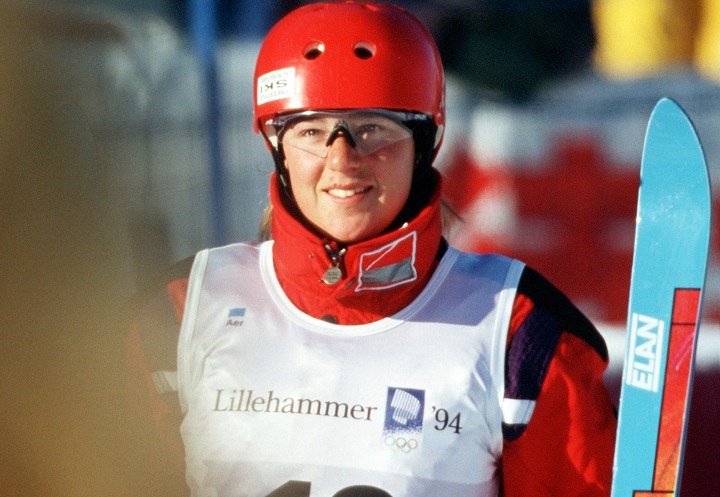MONTREAL – Every four years, like a leap year, the winter Olympics are upon us, filled with drama, excitement, hardship and glory.

After two weeks, the greatest show on earth packs up and everyone goes home.
The winners are often greeted with lucrative corporate endorsements and can bask in the glory of their well-deserved success, but what of the others?
“The difficulty is in forging a new identity for yourself.”
For many athletes the Olympics is a final destination. It marks the end of a long and often arduous career in elite sports, and the beginning of a new reality.
Caroline Olivier, a two-time winter Olympian in Lillehammer, Norway in 1994 and Nagano, Japan in 1998, spoke to Global News candidly about her transition from elite sports.
Heading into Nagano, Olivier, an aerialist with Canada’s freestyle ski team, was ranked third in the world, but a complete miss on her first jump of the semi-finals dashed any dreams of a medal.
Caroline agreed that there is a lot of emphasis on podium finishes as a marker of success, yet believes, “your value as a person and an athlete shouldn’t rest on a medal win.”
She explained that she wasn’t very well prepared to cope with that reality.
Life after competitive sport
She admitted that those feelings weren’t only directed at her from other people, but that she also questioned her own self-worth.
She said that she believes athletes today are better equipped to deal with those kinds of pressures; they have built-in support systems and greater access to psychologists to help them navigate those transitions.
“Your brain is like a muscle, if you don’t use it, it atrophies.”
But Olivier said that she feels that the moment immediately after the Olympics wasn’t the most difficult one in her post-Olympic journey.
“The energy and passion that I had put into skiing, I put into my physiotherapy studies.”
She gives thanks her dad for that.
“He was fond of telling me: ‘Your brain is like a muscle Caroline, if you don’t use it, it atrophies.'”
Her advice to current athletes is to stay in school, even if it’s only a class or two.
“You’ll be better prepared for life post-sports, because yes, there is life after sports!”
The hardest moment for Olivier came in 2002, when she started working.
“I wasn’t sure I liked my chosen profession. I didn’t feel that I was helping people; at least not in the way I had imagined that I would.”
After a lot of soul-searching, she said that she readjusted her expectations and also started reintegrating sports into her life.
“I love my job now and I have found a good balance between my work-life and the sports I do for fun. I couldn’t imagine myself anywhere else.”
With every passing year, Olivier said that she realizes what a privilege it was to be part of the Olympic movement not once, but twice.
The road to glory
As for most elite athletes, the road to the Olympics was a long one.
Olivier started gymnastics at the age of six, and at fourteen moved away from the comforts of the family home in Quebec City, to pursue her Olympic dream in Montreal with the Gymnix gymnastics club.
In a two year span, she lived with two different families and attended two different high schools.
“I was in Montreal for two and a half years” she said, “and during that time I lived with two different families and attended two different high schools.”
She returned home to Quebec City after the 1988 Olympic gymnastics trials where she placed tenth, as only the top seven earned a berth on the Olympic squad.
Switching gears
It was quite by accident that a year later she became involved in acrobatic skiing.
“I had achieved my dream of becoming an Olympian. I just wish I’d taken more photos!”
“I had gone to see the water ramps in Lac Beauport, Quebec where the ramps were being tended by Yves Laroche.”
Laroche was a founding member of the famed “Quebec Air Force”- a group of Quebec-based freestyle skiers that dominated the World Cup circuit in the 1980’s.
In the summer of ’89, Yves was the aerial coach for National Freestyle Ski Team.
“He saw me doing a few flips on a trampoline and asked me if I wanted to try the water ramps. I’d been skiing since I was five, so I said yes. I fell in love.”
A few knee surgeries and one concussion later, Olivier was walking into the stadium for the opening ceremonies of the Olympic games in Lillehammer.
“That moment, of walking into the stadium, is my best Olympic memory. That’s when I realized that I had achieved my dream of becoming an Olympian. I just wish I’d taken more photos!”
When Olivier reflects on her Olympic experience, she said she believes that it’s the road she travelled to reach the Olympics that she values most, not her podium finishes.
“The journey to the Olympics helped shape the person that I am today, and that is something that I can be proud of.”
A few words to the wise: don’t refer to a past Olympian as an ex-Olympian.
They’ll be quick to remind you that “once an Olympian, always an Olympian” – and rightly so.






Comments